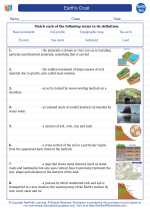Arthropoda
Arthropods are a diverse group of invertebrate animals that include insects, spiders, crustaceans, and myriapods. They are characterized by their jointed appendages, segmented bodies, and exoskeletons made of chitin. Arthropods are the largest phylum in the animal kingdom, with over a million described species and many more yet to be discovered.
Characteristics of Arthropods
- Exoskeleton: Arthropods have a hard exoskeleton made of chitin that provides protection and support for their bodies.
- Jointed Appendages: They have paired, jointed appendages that are modified for various functions such as walking, swimming, feeding, and sensing their environment.
- Segmented Body: Their bodies are divided into distinct segments, with each segment often specialized for a specific function.
- Molting: Arthropods grow by shedding their exoskeleton in a process called molting, allowing them to increase in size.
- Diverse Habitats: Arthropods can be found in almost every habitat on Earth, from the deep sea to the highest mountains.
Classification of Arthropods
Arthropods are classified into several subphyla, including:
- Trilobites: An extinct group of arthropods that were abundant in ancient seas.
- Chelicerates: Includes spiders, scorpions, ticks, and mites, characterized by their two-part body and chelicerae (fangs).
- Crustaceans: Includes crabs, lobsters, shrimp, and barnacles, known for their many pairs of legs and two pairs of antennae.
- Myriapods: Includes centipedes and millipedes, with long, segmented bodies and numerous legs.
- Insects: The largest group of arthropods, with three body segments, six legs, and often wings.
Importance of Arthropods
Arthropods play crucial roles in ecosystems and human societies. They serve as pollinators, decomposers, food sources, and vectors of diseases. Understanding arthropods is essential for agriculture, medicine, and conservation efforts.
Study Guide
To study arthropods effectively, consider the following:
- Learn the major characteristics that define arthropods and distinguish them from other animal phyla.
- Understand the diversity and adaptations of arthropods in different environments.
- Explore the life cycles and behaviors of representative arthropod groups, such as insects, spiders, and crustaceans.
- Examine the ecological and economic importance of arthropods and their interactions with humans and ecosystems.
- Practice identifying common arthropods and their key features through observation and study.
By mastering these concepts, you can develop a comprehensive understanding of the fascinating world of arthropods and appreciate their significance in the natural world.
.◂Earth Science Worksheets and Study Guides High School. Earth's Crust
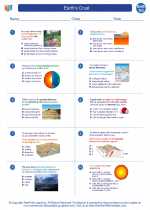
 Worksheet/Answer key
Worksheet/Answer key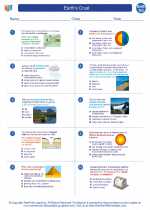
 Worksheet/Answer key
Worksheet/Answer key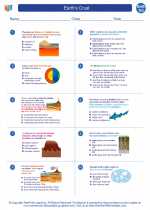
 Vocabulary/Answer key
Vocabulary/Answer key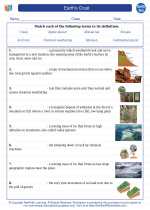
 Vocabulary/Answer key
Vocabulary/Answer key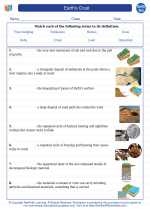
 Vocabulary/Answer key
Vocabulary/Answer key